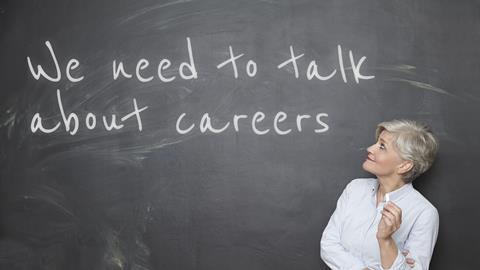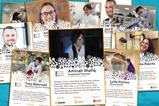Why you need to talk to students about careers
Over the past year, I’ve written a lot about how teachers should, and can, put careers information into their classroom teaching.
Of course, I haven’t been the only person calling for teachers to add things to the curriculum. Recently Parents and Teachers for Excellence (PTE) published Clogging up the classroom – the jostle for curriculum content (pdf), listing 213 different calls for schools to add things to the curriculum. However, almost none of the calls appeared to give any thought to why schools should be teaching these things (instead of other organisations), how full the curriculum already is or the resource implications of the proposals.
Of course, I haven’t been the only person calling for teachers to add things to the curriculum. Recently Parents and Teachers for Excellence (PTE) published Clogging up the classroom – the jostle for curriculum content (bit.ly/2triaQp, pdf), listing 213 different calls for schools to add things to the curriculum. However, almost none of the calls appeared to give any thought to why schools should be teaching these things (instead of other organisations), how full the curriculum already is or the resource implications of the proposals.
Well, I have to hold my hand up here because I have been calling for teachers (and schools) to add careers to their curriculums, but I have thought about why they should be teaching careers, and as an ex-teacher and school governor I am aware of just how full the curriculum is.
So why should chemistry teachers include careers in the curriculum?
Over the past year, I’ve found a lot of chemistry (and other) teachers don’t really know how their school tackles careers, and it certainly isn’t something they had thought of putting in their subject lessons.
So why should chemistry teachers include careers in the curriculum?
While careers in the curriculum (also known as Gatsby career benchmark 4) is now part of the statutory careers provision that schools must provide, the main reason is that, even if you don’t realise it, your students are taking careers information and guidance from you. Teachers are one of the key sources of careers information for young people. Think back to your school days – it’s likely you’re doing what you’re doing now because of one or two significant teachers. Your students look to you as someone who understands your subject, who knows where it can take them, and who makes it interesting and vital for them. They also know you know them and what they are capable of, which external visitors or careers advisers might be less likely to know. Parents and families are another key source of information, but they probably won’t have the broad view of your subject that you do.
The good thing is that including careers in the curriculum doesn’t require wholesale change to your teaching. It’s about finessing what you already do, rather than rewriting everything.
In the sciences, we have an advantage over other subjects, because it is easy to find examples of where our subjects are applied in the real world. That can make it more straightforward to link the topics in the curriculum to answer the perennial question: ‘why do we need to know X?’. We can use the applicability of our subject to straightforwardly include links to future careers as part of each topic.
Of course, depending on your background before you became a teacher, you might feel that you don’t know what careers are available, or what the entry routes to the careers are. This is a common worry, but many resources and organisations provide easy-to-access support for teachers.
Include careers in the curriculum by using a career as the context for homework and revision questions
For example, Including careers in the curriculum suggests using a simple photograph as a starter or plenary activity to get students to review their prior learning and introduce them to careers linked to the topic. The Explore careers section of the National Careers Service website will help you to find out about particular careers, including pathways to the career.
Another way to include careers in the curriculum is by using a career as the context for homework and revision questions. At NUSTEM we’ve been developing a series of worksheets for KS3/KS4 curriculum topics based around career contexts; we’re adding to the series each month.
The RSC’s A future in chemistry can help both teachers and students to find out about careers using chemistry. You can link the information there directly to exam board topics at A-level, and there is a wide range of examples of people who could be called chemists at 175 faces of chemistry.
And finally, for other subjects, STEM learning’s resource library is a treasure trove of career-linked materials, including a range of short video clips of people who work in a range of science-based careers.
Although I am asking teachers to add yet another aspect to the curriculum, putting careers information into subject teaching will improve students’ understanding of how chemistry links to real-life applications, and help them acquire a broader awareness of the careers available to them.
National careers week is 4–8 March.















1 Reader's comment